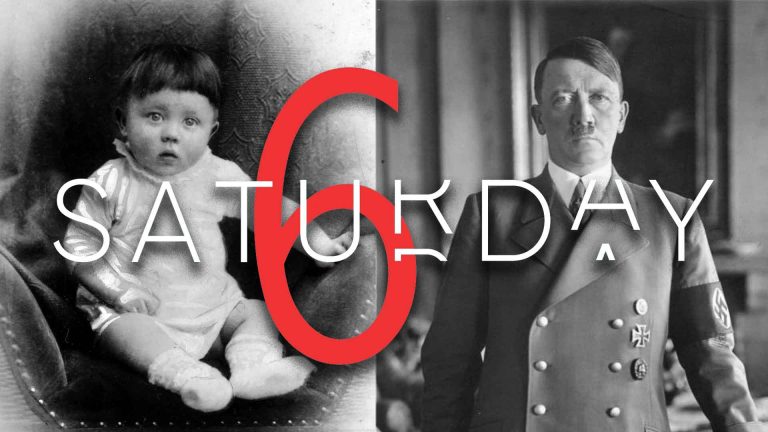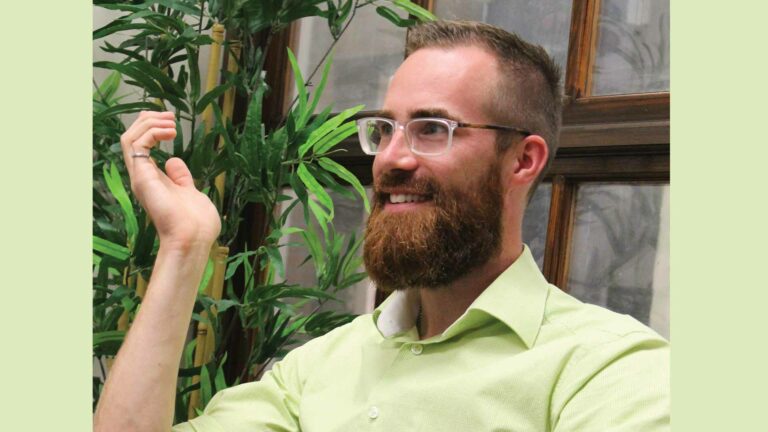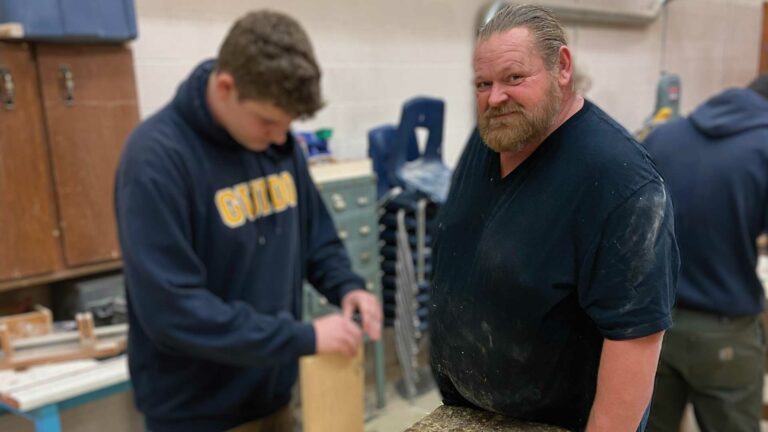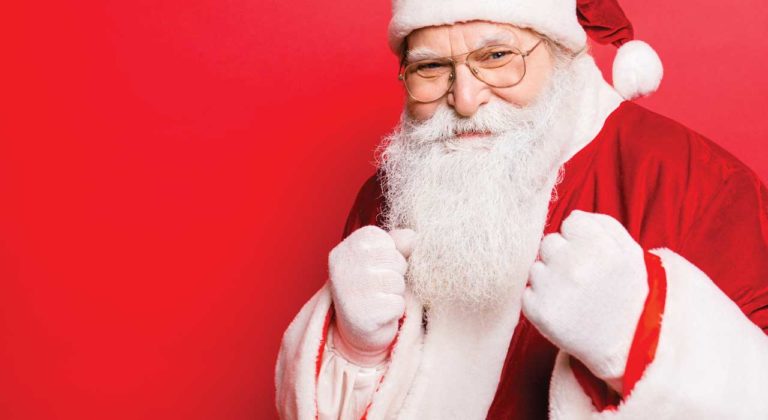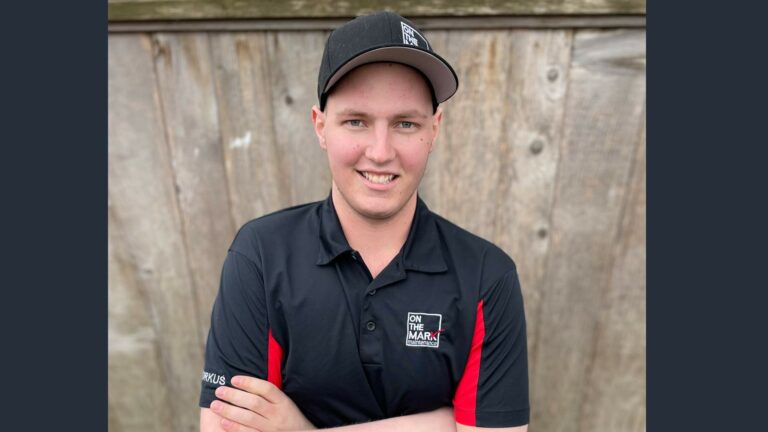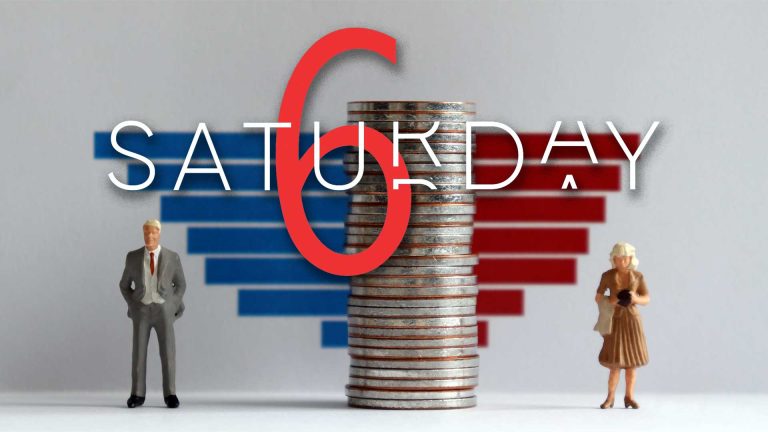Four days in the life of Albert Tenfold
What you'll find below is a Reformed Perspective tradition that started back in the winter of 1991 – 31 years ago! Each year since then, at year's end, and just in time for Christmas holiday reading, Christine Farenhorst has gifted us with a longer short story, and what follows below is her latest edition. We've also included links to reviews we've done for seven of Christine's books, so that when you're finished, you'll know where to go to find even more of Christine's stories.
“I’m going out tonight”
"Now for the matters you wrote about: It is good for a man not to marry. But since there is so much immorality, each man should have..."
Albert always felt slightly uncomfortable reading this passage. He ran his hand over the thin paper of his Bible page and cleared his throat.
"What's the matter? Do you have a sore throat?"
"No, mother."
His mother sat across from him, regal and straight, in the red, high-backed plush chair that had been his stepfather's. She peered at him through her bifocals.
"Shouldn't let your thoughts wander, Albert."
He cleared his throat again and continued to read. "...should have his own wife, and each woman her own husband."
His mother's voice picked up where he had left off. They took turns reading two verses each after meals. He regarded her for a moment as she read, ring-fingered hands resting in her lap. It was one of the few moments he could observe her without her knowledge. Her rather coarse face had an equally coarse voice. Loud it was, and monotonous to the point of dull. She hadn't gone to school here, so perhaps the English.... But then, come to think of it, when she read in Dutch there was no inflection either. The voice was always flat and without feeling. Her gray, rheumy eyes suddenly met his.
"Albert, where are your thoughts tonight? Verse five, child."
He found the place and read on. "Do not deprive each other except by mutual consent...."
As he read, his thoughts smoothed out, smoothed out ridges which he occasionally tripped over and when he later breathed the words: "for it is better to marry than to burn with passion...," he was able to keep his mind on Paul without focusing on the lack of passion in his own life – a passion he occasionally desired.
****
Before Albert cleared the table, he helped his mother to the couch. "Do you want the paper? Or shall I turn on the television for you?'
She shook her head to both questions. "I'm a bit tired, son. I think I'll have a small nap while you do the dishes. In that way I'll be fresh for Scrabble when Mrs. Dorman comes later. Be sure to set out the cups for tea and the cookies..."
He stopped the avalanche of words with "I know, mother. I know."
There was a certain resignation in his voice as he pulled the afghan over her body but a thin thread of irritation unraveled in his hands and a sudden clumsiness overtook them.
****
Christine serves up biographies of six very different men: Martin Luther King Jr., Albert Schweitzer, Rembrandt, Samuel Morse, Freud, Norman Rockwell. Click the cover for our review.
In the kitchen Paul's words swam about as Albert placed the dishes in the sink.
"It is better to marry than to burn with passion..."
Had Paul known more about passion than he did? Had Paul been married? Had he taken a wife with him on his missionary journeys? Or a mother? If Paul had had his mother...
He suddenly grinned at the suds but then became serious. What did he, Albert, know about marriage anyway? His expertise lay in being single. He scrubbed at the potato pan with vigor and frustration. The small kitchen surrounded him with apathy. There was nothing new. Coffee mugs hung on a small rack in the same way that they had hung for years and years. A birthday calendar, with numerous Dutch aunts and uncles enshrined on separate dates, hung beside it. The white refrigerator stood squarely and the patterned tiles on the floor reflected cleanliness and care. The wooden plaque on the wall spoke to him in Peter's voice. "Cast all your care upon Him for He careth for you."
"But what are my cares, Peter?" Albert questioned the apostle out loud and repeated: "What are my cares?"
"What's that, Albert? I can't hear you."
"Nothing, mother. Just go to sleep."
"I'm sure I heard you say something."
"No, mother." He folded the dish towel over the rack and walked into the living room.
"Are you sure you didn't say something, Albert?"
"Yes." He stood in the middle of the room, undecided as to what to do.
"Sit down, son, and read the paper."
"I'm going out tonight, mother."
"Out? But Mrs. Dorman..."
"She's your friend, mother. She's coming to play Scrabble with you."
"But you always play with us. She..."
"I'm going out tonight, mother." His voice was firm.
"Where are you going?" She half sat up, reaching for her bifocals on the side table.
"I'm going out." It was all Albert could manage.
"But..."
"You'll be all right. And I'll be home in good time."
He was out in the hall before she could formulate a reply. ''Albert?"
Opening the closet door, he took his coat off a hanger.
"Albert?" Her voice was growing in intensity.
"I'll see you later, mother." The door handle felt cold under his hand and the hinges squeaked.
"Albert?" It was more of a shout this time and he shut the door firmly, feeling both guilt and relief.
Into the night
Albert Tenfold lived on the fifth floor of a high-rise apartment building with his widowed mother. He was thirty-five and she was seventy. His stepfather had died when he was a teenager. Cast into the mold of male provider at an early age, he had never really been young. Fiercely dependent, his mother had leaned on him heavily, and he had settled under the weight. To the outward eye, they were a model family - a stalwart son providing constant love and care for an aging, frail mother. And it had seemed that way to Albert also - had seemed that way until this last month. Perhaps because he was rapidly approaching his thirty-sixth birthday, he had been doing some thinking. Ten years from now he would be forty-five, almost forty-six, and his mother would be eighty and then, ten years later, he would be in his mid-fifties and she would be ninety. Unless she died - but somehow he could not envisage his mother dead - even though deep down he sometimes wished it. He would be her son forever, her son and not someone's husband. And then guilt would flood over him like a wave of hot wind and he would break out into a sweat. How could he be thinking such thoughts?
The hall was empty. As he plodded heavily towards the elevator, Albert awkwardly buttoned up his coat. It had all been very well to tell his mother that he was going out, but the truth was that he had no inkling as to where he would go. He had few friends - few friends outside his mother's circle, that is. There were a great many Mrs. Dormans; widows who delighted in visiting back and forth; who excelled in speaking of rheumatism and the weather; and who always commented on how fortunate his mother was to have him. The elevator had brought him down to the first floor. He legged it towards the front door. It was raining outside and he stood for a moment, contemplating the sidewalk through the heavy glass panels. He could possibly go to the library. As he resolutely opened the entrance, both the sound of the rain and the fresh air comforted him. Raindrops were a sound he had always enjoyed. Sighing deeply, he pulled up his collar and struck out.
It was quiet outside and almost dark. The faint glow of streetlights reflected and trembled in the puddles. He wished he were going somewhere - somewhere where someone was waiting for him. It began to rain harder as he passed Mary's Dome, the large Roman Catholic cathedral. Although he had quickened his step with the downpour, he stopped for a moment to contemplate the cathedral’s colossal size and grandeur through the sheets of rain. Stone arches glistened in their wetness. He suddenly shivered and coveted shelter. Perhaps he could sit inside for a while. Just until the rain stopped. Turning, he climbed the stone steps which led to massive wooden doors. Gingerly pressing down on a wrought-iron door-handle, he pushed. As the door creaked heavily, an aperture appeared and Albert stepped inside.
Flickering candles
The cathedral foyer was dark and smelled slightly musty. Behind him the massive wood fell heavily into place, the sound echoing and re-echoing. Hesitantly he walked on through the foyer into the lighted sanctuary. It was huge compared to that of his own church - and comparatively quiet. There people talked and whispered behind their hands when they walked in. They rustled bulletins and took out peppermints. But perhaps because there were so few people here... He inhaled the quiet and relaxed. Three or four people were present in the front pews, heads bowed and silent, praying, as far as he could tell. Albert stood for a moment and then slowly made his way toward the middle of the church, sliding into a seat on his left. The pew was small - almost too small for his bulk. He grinned to himself. What would his mother say? Or his ward elder? Or Mr. DeVries, his employer and an avid commentator on false churches? After a while the quiet had embraced him to such a degree that he felt as if time had stopped. Did it matter to God whether you sat in a Reformed church or a Roman Catholic one? Of course it did, he knew that. But it was raining proverbial cats and dogs outside and the state of one's heart, was that not what God considered? He pulled out his handkerchief and wiped his face dry. If a church happened to be on your way in a rainstorm and that church was Roman Catholic, well then... Well then, what? It certainly was peaceful here. He cautiously examined the stained-glass windows on his right. Impressive and grand, they made the raindrops outside them glow with color through the matted glass as they danced their way down in rivulets. He shifted his frame somewhat and his foot knocked against a wooden slat beneath the pew in front of him. He contemplated the kneeling bench with interest. Padded with red leather, it appeared comfortable. He glanced about again. There was no one present except the few worshippers at the front and the only one staring at him directly as he peered about was a statue of Mary in the aisle next to him. Clad in a sky-blue stone robe, she eyed him serenely. Cautiously he slid his knees onto the padded red leather and bowed his head.
"Our Father..."
He could not recall ever before having knelt for prayer in church. He did kneel for prayer when he went to bed. It is not a matter of knees or kneeling, the minister had told them in catechism, but a matter of the heart. And yet, kneeling always made his heart more submissive. Was it submissive now? So many thoughts.... Could you be submissive with so many thoughts running around in your head?
"Hallowed be Thy name..."
There was a strange smell here. It reminded him of... What was it? Christmas was the time when mother brought out the candles. It was the scent of sweet tallow. Mary's statue, just ahead of him in the center aisle, had a number of candles in front of it. Several of them were burning. Luther had knelt in such churches and so had Calvin. But he was neither a Luther nor a Calvin. Imagine people four centuries from now saying that they were Tenfoldian or Tenfoldistic.
He ran his hand over the wood in front of him. The grain was smooth. Sometimes he was not even sure of the truth he stood for. Was the truth always smooth? He went to church, had gone to a Christian school, read the Bible at mealtimes and before he went to bed, prayed at set times and was able to recite a fair number of the catechism questions and answers. Did those matters encompass the truth? And if he heard a lie, would he be able to detect it? He sighed. All of life, all of life... was it not one confrontation after another? Were simple problems not large ones in miniature? And each spoken word... Were you not judged for it?
"Thy kingdom come..."
Most times, he admitted to himself as he shifted his knees on the red leather, he had no thoughts of God's kingdom at all. There were only the day-by-day affairs of coping with small things, of pleasing his mother and of doing his work properly for Mr. DeVries.
"Thy kingdom come...."
He moved his body back up onto the bench again and rubbed his knees. In heaven there would be no marriage. The statue of Mary smiled at him benignly. The Roman Catholics believed that she was immaculate, pure, undefiled; and that she had never had relations with her husband Joseph. The figure certainly seemed flawless. There was one thing he had never doubted about her and that was that she surely must have loved her Son. But then, Jesus would have been easier to love than an Albert. Contemplating the statue, he began to whisper confidentially.
"I know that you were highly favored, but you were human - you did have sin."
Mary kept on smiling. A dozen candles shone brightly at her feet. He imagined lighting candles at his mother's feet, imploring her to intercede, begging her to help with some problem. Did candles have to be made of tallow? Did he not often light candles at his mother's feet in other ways? Did he not do it by always deferring to her and conceding that she was right; by asking if he might do this or that; by permitting her to take a role that somehow made him weak and ineffective, even though it seemed to all the world that he was the provider and the man of the house. Tonight was actually the first time that he could recall that he had actually done something without asking her permission. He regarded the statue again. The sky-blue of the robe was peaceful and Mary’s eyes were pensive, as if she was thinking deeply. But there was a hair-line crack along the folds of her stone robe.
He knelt down again on the leather and rested his forehead against the pew in front of him. He did love his mother. Hadn't he taken care of her all these years? Perhaps, perhaps he just didn't like her. Did she love him? Had she reason to not love him? His forehead rubbed against the smooth wood and slipped just a bit as sweat trickled past his eyebrows. He could not recall that she had ever said, “I love you, Albert.” There had been phrases like “I'm proud of you, Albert,” when he had graduated from college, and if he donated money to the church or Christian school, she would say, “The Lord loves a cheerful giver,” but that was about as close...
“You are a priest, then?”
A slight noise to his right startled him. He raised his head and saw a woman standing by Mary's statue. She fumbled with her purse and Albert watched her take out a wallet, fish out and fold a ten-dollar bill before depositing it into a slot. She made the sign of the cross and lit two of the candles. Hunching down, her clasped hands almost touching the carpet, she was evidently praying. Her blue raincoat dripped water onto the carpet staining bright red. He watched her for a long time. She was motionless but he could see that her lips were moving. What petition, he wondered, was worth ten dollars? What question so burned her heart that she had to kneel down on a faded, red carpet in front of a lifeless statue? Had Eli watched Hannah in this manner? She rose and turned and he could see that there were tears in her eyes. Ashamed to be watching, he bowed his head down on the pew wood again.
"...a rare treasure, a must for all parents!" click the cover for the rest of our review.
"Excuse me. Could you tell me what time it is?”
He opened his eyes. The woman was standing by his side.
"I'm sorry to bother... to bother you." She stuttered a bit in embarrassment and he pulled up his coat sleeve to check his watch.
"That's all right. It's a quarter after nine."
"Thank you." Her blue raincoat was still shiny with rain and black hair curled damply around an oval face. She was fairly young. He would guess her to be around twenty-four or five.
"Are you the... the priest?" She looked at him rather anxiously and he wondered if he had put on his collar backwards. The statue of Mary silhouetted behind her and compassion overcame him for her misplaced faith.
"The priest?"
"Yes... He was to meet me at nine. I thought... thought that you ...?"
Clearly, within the chambers of his mind, he heard Peter's words, "But you are a chosen people, a royal priesthood, a holy nation, a people belonging to God, that you may declare the praises of Him Who called you out of darkness into His wonderful light."
The girl continued to stare at him. Her dark blue eyes were pensive and he smiled at them. "I'm not the priest. That is to say, I'm not the priest you're looking for."
"Oh, but you are a priest then?"
"Well..." He looked for words to explain to her that as a believer he reflected the glory of God and... His thoughts got no further.
"If you're not busy, maybe you have time to speak to me for a moment?"
He saw the statue smiling at her back and got a whiff of the tallow. "I'm not Roman Catholic."
For a small moment looking into her dark, blue eyes, he was sorry he was not. The girl blinked and took a step backwards.
"You're not?"
He shook his head. "No, I'm sorry if my being here misled you."
"You were praying." She said it defensively. He felt a trifle foolish and stood up.
"I came in out of the rain. It's very peaceful here. Yes, I was praying."
"I'm not Roman Catholic either." She suddenly smiled up at him and he could see strong, irregular, white teeth.
"Oh?"
"If you were praying," she was earnest again, "maybe you know about God... about prayer…?”
“You might be a king, but…”
Albert Tenfold had led a very structured life. It had been drilled into him that organization and discipline were next to godliness. When he was growing up, his mother had always made sure that he had porridge for breakfast, drank milk with his lunch and went to bed at a set time after dinner. Christian grade and high school were givens and catechism lessons a must. There were always two services to attend every Sunday, regular Young People's meetings, and occasional youth rallies. After he had made a public confession of his faith at age seventeen, he had tithed, celebrated the Lord's Supper every two months and attended study weekends on various Bible topics.
"About God...?" he answered the girl slowly. "About prayer?"
She nodded at him. During his entire thirty-five years of Christian living, Albert had never been confronted with questions of this sort by anyone outside of his church circle, and they hung in front of him like an unused banner. He played for time.
"Do you want to go for a coffee and talk for a while?"
She considered him for a long moment and he wondered if she felt that this cathedral was a safe place, a place where strangers could be approached without fear.
"I'd talk here but it's just that..." He stopped abruptly and made a small gesture towards the front pews with his head. There were still some people there and Albert's whisper carried.
"Sure, I'll go for a coffee." Turning her back on the statue, she walked down the aisle ahead of him and he followed.
****
74 short stories make for great devotionals with your kids! Click the cover for our review.
The rain had eased off considerably. There was a smell of sweetness in the air and in the distance a dog barked.
"What's your name?" She asked the question almost as soon as they reached the pavement.
"Albert. What's yours?"
"Victoria, but my friends call me Vicky."
He grinned.
"Why are you laughing?"
"Albert and Victoria."
She looked at him blankly.
"You know," he explained, "the king and queen of England."
She grinned too. "Well, you might be a king but I'm not exactly a queen."
He awkwardly offered her his arm as she gingerly edged past a puddle on the sidewalk. She took it lightly. He barely noted her touch. Out of the corner of his eye he saw that her hand was small and that her fingers had well-rounded, clean nails. He could not help but think of how his mother would cling to him in this sort of weather. His mother who always wore gloves. Her voice bounced off the sidewalk now and he heard her command clearly within the chambers of his mind. "Your arm, Albert! Give me your arm!"
He sighed and quickened his step. She looked up at him questioningly. "You probably have other things to do, right? Actually you don't..."
He didn't let her finish.
"No, no. I'm sorry if I've given you the impression that ... that I'm not enjoying myself." He finished the sentence rather lamely and almost blushed.
****
The coffee shop was crowded and the noisy atmosphere fell about them like an intrusion. They stood in line for a while behind one another, not speaking, studying the pastry behind the glass.
"I'll pay for my own." She spoke curtly and avoided looking at him.
"No, please..." He didn't really know what to say but went on hesitatingly. "I'd be honored to pay for your coffee and..."
"Maybe," and she interrupted in a low voice, "maybe you won't be honored after we talk."
He felt unsure suddenly. Maybe this girl was a prostitute; maybe she had committed a murder; maybe... He got no further with his thoughts.
"Can I help you, sir?"
"A glazed donut, please, and a coffee."
"To go?"
"No, we'll eat here."
Vicky ordered the same and allowed him to pay.
“Sometimes, you want to redo time…”
Providentially there was an empty table by a window. It had begun to rain again and the sound eased the tension between them. Albert stirred his coffee and wondered how to begin the conversation. But he didn't have to.
"Do you still want me to talk to you?" she said.
He looked at her. She was fingering her donut without eating it. Damp hair clung to her forehead. "Yes, of course... but if you'd rather not…"
His spoon sploshed some coffee over the side of his cup and she reached for a napkin from the holder on the table.
"Oh, I'd like to talk to someone. Actually I have to talk to someone or..." She stopped and rubbed the brown puddle on the table fiercely, small fingers white with the pressure.
"Well," he said, matter of factly, "well, I'm here and at your service."
She took a small sip of her coffee, smiled nervously at him and began. "A year ago I was a student at the university here in town. I was enrolled in Political Studies..."
She lifted her coffee with both hands and stared out the window. He waited. He didn't have to wait long. She no longer seemed to be speaking to him but, considering her reflection in the window, addressed it.
"I resented most things... rich people, styrofoam, male chauvinists, acid rain and apartheid. I joined Greenpeace, the Sierra Club and Amnesty International and talked about a lot of things without really understanding any of them. I said that I was an agnostic and I was flattered when I raised eyebrows."
She paused for breath, put down her cup and crumbed off a piece of her donut. Not eating it, but turning it over in her hand, she went on.
"All my friends were saying the same sort of things. One of them... One of them..."
She picked up her coffee, sipped again and returned to her reflection in the window.
"To make a long story short... Well, I became pregnant... The father was someone I hardly knew... and the baby I conceived was just another thing I didn't really understand."
Albert had been watching her face. He had been listening to the sound of her voice thinking that it didn't really fit in the story. She had a child's voice and her hands were a child's hands.
"The group I hung around with all advised me to go for an abortion. So I did what was expected of me. I scheduled an appointment for an abortion at a health clinic."
Albert sat up straighter and took a bite out of his donut. His heartbeat increased and he felt sweat trickle down his armpits.
"But my friends... they suggested that I try a new abortion technique. It was a drug. So I... I looked into it. There was a special clinic and it was close to where I lived. I went to it."
****
Some people passed their table and Vicky stopped talking. She gulped down some of her coffee and coughed. Albert cleared his throat. He racked his brain for Biblical texts - prayed for some homily to come to him which he might deliver here at this coffee shop which would relieve the tension and which would both teach error and convey compassion. "I... There was a staff."
Vicky seemed not to notice his discomfort. Engulfed in the past, her voice kept on confessing.
"They examined me and had me sign two documents. One was a release form and one was a government something or other. Then a nurse came and she had this small suitcase. She explained things... like how this drug would work. I didn't understand it all but didn't let on. I was scared."
Albert took another bite of his donut. It tasted bland and he had trouble swallowing it.
"Was I sure I wanted to go ahead? That's what the nurse asked. And I said, yes... yes, I was sure. And then she opened the suitcase and gave me a small box. There were three pills in the box, just three little pills. She brought me a glass of water and then I... I swallowed those pills. Just like that... just like that."
Her voice broke and Albert took a swallow of his coffee and cleared his throat again. Vicky pushed her donut towards the center of the table and picked up her napkin.
"Sometimes you want to redo time, to relive just one moment. Have you ever had that?" She turned her face to him fully for the first time and he noted that her eyes were blue with small flecks of green in them. He answered slowly.
"I've had that. Yes... I've had that lots of times. It's because we continually do things that we regret later. We always..."
"Yes," she interrupted, "but what if the thing you do is so..." She stopped again and then went on. "The pills made me sick. I had cramps, nausea and diarrhea and I bled... I just bled and bled. I phoned the clinic and they told me not to worry but I felt so ghastly. I could barely get out of bed to make it to the bathroom. There was so much pain and I couldn't focus properly. I finally phoned for an ambulance. They came and took me to the hospital."
"Did you... Had you..." Albert couldn't help but ask, "Had you lost the baby?"
She stared at him with her blue eyes. "Lost it? You don't understand. If you lose something... Well, you can maybe find it later. I failed to abort with the pill but it had done the job. The child in me was dead and, as a result, I had to have a surgical abortion and... And during that surgical abortion my uterus was punctured. There was infection, a bad infection, and then I had a hysterectomy."
"Oh."
It was all Albert could manage. He played with his cup and noted that it had stopped raining. Were these the words Vicky had prayed to Mary? Was this what her silent lips had been speaking of to a mere statue? Had she lit a candle to atone for murder? He shivered.
“I have to apologize to someone”
"They didn't tell me that I would be feeling such guilt. No one ever mentioned the fact that I would feel such a..."
She stopped and tried again.
"No one explained. You see, I know for a fact that it was a child... not just a nothing... and I killed this child... my child. My friends didn’t understand when I tried to explain how I felt... and I was so lost."
“Your family..." Albert got no further than two words. She laughed.
"I have no family. That is, my mother died when I was seven and my father is living with wife number four. I haven't been home for years and don't plan to go there now."
"Oh."
Again, it was all Albert was able to say. How would his mother react to a Vicky? "Mother, may I introduce you to Vicky. She just had an abortion and is feeling a little down."
"I... I realize that whatever it was that I was trying to be or say last year and before that, was a fraud - was not real. But I know that there is something real. There has to be! And I'm trying to find it. So I wanted to ask the priest about God and then he wasn't there. But you were there."
****
There are 9 short stories here, and “I was a Stranger” is reason enough to pick it up. Click the cover for our review.
Albert was suddenly calm.
"You see," she went on, staring out of the window again, "if there is nothing, then I wouldn't be able to live. I... I... I don't know if you understand, but I have to be able to apologize to someone for... for killing this baby."
There was a sudden clap of thunder outside and the rain resumed with thick drops splattering the sidewalk. Vicky shivered. Albert began to speak. Cautiously his voice crept across the table.
"I think I understand what you mean," he said. "Can I tell you something about myself - something I haven't told... something I have never told anyone." He stopped. She turned her eyes towards him. He could read neither approval nor disapproval in them.
"Sure." Her passionate voice had become flat. It had turned bland, disappointed perhaps. Maybe she wanted a quick answer. But he wouldn't be able to answer quickly. He looked her full in the face.
"It isn't easy for me to speak actually. I'm more of a doer than a speaker."
She didn't respond and he went on hesitantly, choosing his words with care.
"I was born during the first year of the war. We lived in a small village somewhere in the north of Holland. I don't remember much."
His hands crumpled the napkin he was holding.
"It’s funny, the things that I do remember though. Things like the creaking of the cradle I must have slept in; things like a horse pulling the milk cart passing our house every morning. My mother says that my first word was horse."
He looked at her, waiting for some sort of response, but there was none. And his intuition told him that she wasn't really listening because the words meant nothing to her, nothing at all. But he went on all the same.
“My father had a good job. He was a lawyer, a very good lawyer my mother tells me. He conducted a lot of business and people liked him very much. When the war came, he helped people. He helped Jews in particular. The strange thing is that I don't remember my father's face but I do remember that he was tall, very tall. Perhaps I remember that because he used to throw me up into the air and catch me in his arms."
“My heart accused me…”
Vicky was still not reacting to his story at all. If anything, she was slightly uncomfortable. But Albert persisted.
"During the first years of the war my father lived at home. He was not suspected by the Germans of any subterfuge even though he was involved in the underground. His specialty had something to do with illegal documents. But later on he had to leave our house and go into hiding. My mother and I only saw him on those few occasions that he deemed it safe to come for a short visit. On one of those visits the Gestapo must have been tipped off because shortly after he arrived they surrounded our house. My mother was frantic and father hid behind a secret panel in the living room. When they came into the house a moment later, she and I were in the kitchen. They didn't ask where he was but simply began searching."
Albert stopped and stretched his legs under the table. He wasn't looking for a reaction in Vicky's eyes anymore. He had actually almost forgotten she was there.
"And then... What happened then?" Her voice called him back and he saw that she had become genuinely interested.
"Then? Well, miracle of miracles, they didn't find him." He stopped and stretched his legs again.
"What was the point of telling me that story?"
"The point? I'm still coming to that. You see, after their combing of our entire house, one of the officers hunched down by me, small boy of three that I was, and began to play with me. He had a chocolate bar in his pocket and even though my mother frowned, I took it when he gave it to me. He helped me unwrap the candy and I began to eat... and all the while my mother was glaring. But it tasted wonderful and the man seemed so friendly. When he took me on his lap a moment later, I completely ignored my mother and freely smiled at him. He joked with me and then asked if maybe my father was maybe playing hide and seek. I laughed out loud, greatly amused that he would ask such a question. He laughed too and asked where my father, who must be very clever indeed, might be hiding. I slid off his lap, walked into the living room and stood by the panel. When they discovered my father a few moments later, I remember that I did not feel quite right about it but didn't really understand why. When I ran to my mother for comfort, she spat in my face. Then they... they took him out into our yard and shot him, right in front of the house. The soldier who had given me the chocolate said, 'Danke schön,' bowed to my mother and myself, and left. He was mocking us. Afterwards, my mother made me go out to look at the dead body of my father... and I screamed and screamed until the neighbors came and took me away."
"You didn't mean it," Vicky said. "You didn't know what you were doing. You were only a little child."
"Yes," Albert answered thickly, "you are right. I was only a child."
The thunder rolled in the distance and Vicky's eyes were sympathetic when she said, "How did you... How did you manage? What did your mother...?"
"She... I lived with the neighbors until the end of the war. She didn't want... me."
"Oh." She drummed her fingers along the table edge and regarded Albert seriously. "You were praying in church. You told me that you were praying. So, what did you do with your guilt? Or, didn't you pray when you were little? Or, what I'm trying to say is how did you deal with the fact that you caused...?"
7 stories from the 2 World Wars. Click on the cover for our review.
She stopped abruptly. He smiled at her. The fact that he now felt forgiven for the death he had caused did not make it any easier to speak of this time.
"No one really spoke to me about my father's death. The neighbors were very kind. But as I grew older I felt, also because of what other children said to me at school, that I was solely responsible for the fact that my mother was a widow. When my mother remarried in 1946 I had been living with her again for about a year and my stepfather made plans to emigrate to Canada. We never spoke of my own father. As I grew older my mind told me that I had only been an ignorant child during the war, but my heart accused me of murder every day. We went to church, yes, and we read the Bible."
Vicky's eyes were wide with affinity. Albert went on.
"What finally saved me from this terrible guilt feeling, Vicky, was the fact that God allowed me to see that He was totally in control of all things."
He was quiet and for a moment saw himself earlier that evening, kneeling in the pew. He had been thinking about truth, the truth that God controlled one's life, the truth that God's tender, loving control had always drawn him with cords woven throughout everyday life. Vicky continued to look at him and he went on.
"God was in control of my father's life. He had stipulated when and where my father would die. And, I was also led to see that, but for my father's death, I would not have been as drawn to study the Bible so thoroughly to investigate the mighty God I worship, the God Who forgives when we are truly sorry."
Vicky stared at him unblinkingly. He wondered if she had understood what he was saying.
"I think that if you are looking for God, Vicky," he finally ended, "it's safe to say that He is making you look, that He has used this very tragic thing that has happened to you, this abortion, to make you look for Him."
“I can tell you where to look”
A waitress stopped by their table. "How is everything with you folks? Anything else you need?"
"No, thank you." Albert was quick to answer but then amended, "Maybe you would like some more coffee, Vicky?"
"No, no thank you." Her voice was thin and lifeless. The tables around them were almost empty.
The waitress smiled. "All right. We'll be closing soon. It's after eleven."
Albert glanced at his watch. He imagined that his mother would be livid by now. He took out the small notepad and pen he kept in his pocket and jotted down his church address.
"I can't give you faith, Vicky. I can't give you forgiveness either. But I can tell you where to look for it."
"I know God is there." Vicky whispered the words. "I know... but I don't know how I know."
"Do you have a Bible?"
"Yes, I bought one last week."
"Then you must read it every day."
The lights in the restaurant dimmed and they automatically stood up. The rain had let up again.
"I'll walk you home."
"No, no... I live very close by."
"Well, then it shouldn't be a problem."
"No, no... please, I need time to think and be by myself. Thanks."
The waitress eyed them impatiently as they walked past her to the door.
"Thanks again, Albert."
"Goodnight, Vicky."
He watched her walk away, small and slight in a coat the color of her eyes, and felt some pain.
“It’s your mother…”
In the elevator ride up to the fifth floor, Albert rehearsed what he would say when he walked in. There was no doubt in his mind that his mother would still be awake.
"Albert?!"
"Yes, mother."
"Where were you all evening?"
"Out with a girl, mother. She'd had an abortion and felt rather miserable. So I took her to a coffee shop and tried to tell her about the forgiveness we can have in Christ."
He contemplated the elevator buttons and continued his conversation.
"Do you know about forgiveness, mother? You don't, do you?"
"Albert, what kind of way is that to speak to your mother?"
"Sorry, mother, but I had to say it sooner or later. Even though God forgave me for inadvertently causing father's death you never let me forget that I made you a widow. You never let me forget that I was the one who..."
The elevator had reached the fifth floor. The hall was quiet and Albert's inward voice dissolved.
****
He took out his keys as he walked towards the apartment. They jangled and he stifled a yawn, hoping against hope that his mother would, after all, be asleep. Before he could fit his key into the lock, however, the apartment door opened. Mrs. Dorman stared up at him.
"Albert, you're finally home."
"Yes, but what are you still doing here, Mrs. Dorman?"
"Your mother, Albert... It's your mother."
"What about my mother? What's the matter with her?"
They were still standing in the doorway and he moved past the small, dark woman into the apartment.
"Maybe you should sit down before..."
"What's the matter with my mother, Mrs. Dorman?"
"She felt ill, Albert. She had a pain in her chest. So I called an ambulance..."
"Yes?" A strange feeling came over him.
"They came within five minutes of my calling and the attendant said that it was her heart."
He stared at Mrs. Dorman. The woman was nervously twisting her hands together.
"It was a heart attack, Albert. I rode in the ambulance with her to the hospital. They took her to intensive care. But before they took her there I promised that I would come back to the apartment and wait for you."
"Thank you, Mrs. Dorman. That was kind of you."
"Are you going down to the hospital now?" She looked at him, her eyes wide and helpless. His mother was her best friend.
"Yes, I will and I'll phone you in the morning to let you know how things are."
"Thank you, Albert. Thank you."
She walked towards the door and then turned. "Wasn't it too bad that you were out just tonight of all nights?"
"Yes. Goodnight, Mrs. Dorman."
****
After he closed the door behind her, Albert walked into the living room. A just-begun Scrabble game lay on the table. The words apple, tax and problem stared up at him - three words made by his mother and Mrs. Dorman. He ran his fingers through the word “problem” and then tilted the board, emptying the letters back into the Scrabble box. Maybe his mother had already felt ill when he had left. She had looked just a bit off color. He closed the box and sighed. A great weariness crept over him. But greater than the weariness was the feeling that he had failed somewhere - again. He sat down and cupped his face with his hands. If he was really honest with himself he had to admit that he had no great affection for his mother. “Honor your father and mother - which is the first commandment with a promise - that it may go well with you and that you may enjoy long life on the earth.” He didn't really know at this precise moment whether or not he had honored his mother. Holding him with invisible ropes as it were, she had made him aware of the past in innumerable ways. The small clearing of her throat, for example, when the minister read the sixth commandment. It had always made him edgy, nervous, countless times as a child, and still caused him to squirm. Not because God had not forgiven him, but because she had not. He sighed again and slowly stood up. Better go to the hospital and see how things were.
“Forgetting what is behind…”
It was still raining when he drove the car through the streets not five minutes later. The windshield wipers beat a soft rhythm and the quiet of the hour calmed him somewhat. He could not stop thinking about his mother's life. She had been happy, as far as he could tell, with his stepfather. His stepfather had been a good husband, a kind father, a gentle and hard-working man. But his mother had always been reserved, had always held back. Albert could not remember that he had ever seen her kiss his stepfather. Neither had she ever kissed her son for that matter. He could not remember either, that she had ever sung spontaneously or laughed genuinely at something silly. On the other hand, she had always cooked good meals, had provided adequate clothing and had kept the house very neat. She had led an ordered existence, an ordered existence that would now, he went on to think, maybe come to an end. What could he say to her as she lay on her hospital bed? If he could never speak to her again but this one time, what was it he should say to this woman who had, after all, borne him in her belly for nine months and who must, it seemed to him, have harbored some love for him. But he could not feel that love as he sat in the car and drove through the dark.
****
The streets were deserted but he stopped punctually at every red light, playing for time, having no particular desire to get to the hospital quickly. He thought of Vicky - a compassionate, young woman who had wept because she had killed her unborn child. Perhaps Vicky had more compassion for her dead child than his mother had ever had for him. No, that was a ridiculous thought, an unfair thought. He rubbed his forehead with his right hand and, returning it to the steering wheel, found it wet with sweat. He should not be unfair. What was it he had said to Vicky? Nothing, he had said, nothing is outside of God's control. God had used the tragedy in his life to make him realize just how dependent he was on God. What was it the minister had preached on last Sunday? Oh yes, forget what is behind and strain toward the goal for which God has called us. Another red light - he brought the car to a slow stop. His mother had been unable to forget what lay behind her. They had never really talked about his father and what had happened - never. Would they be able to talk about it now? If they talked about it, would she be able to forget - to forgive? Was it hampering her road to heaven? He should have talked to her at some point. The light turned green. He stepped on the gas and began to drive faster. Was it not also true that, if she had maintained a grudge against him all these years, he had also nurtured a grudge against her? He drove through the next red light.
****
The hospital entrance was quiet. The glass doors opened silently under his push.
"Can I help you, sir?" The nurse at the desk looked efficient.
"My mother was admitted earlier this evening - a heart attack. I've just heard and now...."
"What's your mother's name?"
"Drooger."
She consulted her book and peered up at him from her swivel chair.
"She's in intensive care, sir. Fourth floor. You'll have to ask at the desk there."
"Thank you."
He walked on towards the elevator.
“Perhaps it was a blessing”
The fourth floor corridor had a red carpet - red, the color of blood. He walked over it quickly and with some trepidation. Two nurses presided at the desk. They both looked up at him and smiled. "Yes?"
A unique look at Luther and his times - click the cover for our review.
"My mother was admitted earlier this evening with a heart attack. I understand she's in intensive care." He eyed the double doors behind their desk to the intensive care unit with some degree of dislike. They appeared so grim, grey and dismal, as if they only let in and not out.
"Your mother's name, sir?"
"Drooger." He spoke with some impatience.
"Drooger?"
"Yes."
There was some hesitation on the nurses' part before one of them responded, "Could you wait in the waiting room, sir? I'll ring for the doctor on call to speak with you."
"The doctor?" He spoke cautiously, tripping over the word. "Why must I speak with the doctor? I just want to..."
"He'll be with you directly. You can sit down over there, sir." They indicated a small lounge behind the desk and smiled at him.
"All right."
He walked towards the lounge, clumsily scuffing his feet on the red carpet, uncomfortably aware that both nurses were eyeing him behind his back.
****
There were three brown chairs and a leather couch. Indecisively he stood for a moment and then sank down heavily into one of the chairs. The table sported magazines - colorful editions featuring smiling men and ladies. The clock on the wall told him it was 12:01. He picked up one of the magazines and then laid it back down.
"Mr. Drooger?"
A young man had materialized at the entrance of the lounge. Albert stood up.
"My name is Tenfold, Albert Tenfold. Mrs. Drooger is my mother."
"Please, remain seated. I'd just like to speak with you a moment."
"My mother..." Albert was afraid to phrase the question. The young man came closer and bending down, offered his hand.
"I'm Dr. Ellis."
"Glad to meet you."
Dr. Ellis sat down on one of the other chairs and Albert waited.
"Your mother was admitted around nine o'clock this evening. I happened to be on duty and so I attended her."
"It was a heart attack?" Albert began searching out the pieces of the puzzle that lay between him and a finished picture - pieces that the doctor held.
"Yes," Dr. Ellis nodded and queried, "You live in town?"
"I live at home with my mother. I was not there tonight when she became ill." Albert's voice was meticulous and short.
"Ah."
"My mother..." Albert began again.
"Yes, your mother did have a heart attack."
It was now 12:05. The clock, Albert thought, seemed to move faster than this young man. "How is my mother?"
Dr. Ellis reached out a thin and long hand and placed it on Albert's knee. "I'm sorry, Mr. Tenfold. Your mother passed away about an hour ago."
Albert sat very still. The doctor removed his hand and regarded him solicitously.
"Is there something I can get for you - a coffee?"
"No, no, thank you."
"It may sound callous, Mr. Tenfold, but perhaps it was a blessing. You see, it was a massive heart attack. There had been extensive damage - several organs were not functioning anymore."
"May I see her? May I see the body?"
“Perhaps milk and honey”
The room in which his mother's body lay was very quiet. The doctor had offered to come in with Albert but he had refused, saying that he wanted to be alone. As the metal door fell shut behind him, he stood leaning against it for several moments, breathing in the nothing odor of the room. His mother’s form scarcely made a dint under the covers of the bed. For a moment he thought he saw the sheet moving, moving up and down as if his mother was still breathing. But it was fool's gold, because when he moved closer there was only stillness, unbroken stillness.
****
Might be Christine's best. Click the cover to read our review.
He stood at the foot of the bed and held onto the railing. "Hello, mother."
Moving to the side, he pulled up a chair and sat down.
"I've been gone most of the evening, I know," he went on, "but I didn't know. I really had no idea that you would die tonight."
She didn't answer and he looked down at his hands.
"You know," he went on, looking up again, "I thought that I might get a chance to talk to you tonight about the past. As I drove down in the car I was thinking about all the things that I would say to you. And now it's too late."
He stopped and pulled his chair a little closer to the bed.
"But maybe it's not too late, not too late for me, that is. You see," and he looked up again at her dead form, "you see, maybe if I had brought it up, maybe if I had told you that I was sorry, the way I told God that I was sorry, you might have forgiven me. Now you died without forgiving me."
His voice caught and he lay his head on the edge of the bed's steel railing. But the words flowed on, the words tumbled out past all the years of stifle, hitting the floor with their vehemence.
"Yet maybe this evening you did forgive me. Before you died, perhaps you thought, ah, I should have told my son that I love him. I should have..."
His voice broke again but still he went on.
"I do not know that you did. I cannot judge that. God will judge that... and this is what I want to say to God and to you - I forgive you, mother. I forgive you for haunting me, for never allowing me to have my own life outside of yours all these years."
He wiped his face with the back of his sleeve, before he went on. "... and yet it was my own fault too. Because I let you do it and I could have stopped it."
****
He stood up and regarded her face. Smooth and unperturbed, she lay silently. It was almost as if she would open her eyes in a second and say, "Albert, is the tea ready yet?" "No - no tea, mother," he whispered, "but perhaps milk and honey -perhaps that."
Then he left the room, not stopping to turn for a last look.
“It’s been three days…”
Three days later there was a funeral. Although Albert accepted myriad condolences at the funeral home, he was not quite comfortable with the “I'm sorry about your mother...” remarks. Was it necessary, he reflected, as he sat in the left front pew, flanked only by the three church members whom he had asked to be pallbearers, that others knew how he felt? Was it necessary that someone understood? The minister read from John, unperturbed by Albert's thoughts.
"When Martha heard that Jesus was coming, she went out to meet him, but Mary stayed at home. 'Lord,' Martha said to Jesus, 'if you had been here, my brother would not have died. But I know that even now...’"
****
There was no clock in the sanctuary. The coffin stood directly beneath the pulpit. His mother had always sat in the ninth row from the front. Albert turned his head slightly and almost expected to see her there, smartly dressed in her green summer coat, straight and dignified with her eyes on the minister. There were a lot of people behind him and his gaze passed over them impersonally, passed over them and then suddenly stopped. In the exact place where his mother had been wont to sit, was a slight figure in a blue raincoat. “‘If You had been here,' Martha said to Jesus, 'my brother would not have died.’” The minister's voice rose and fell about his being.
"These words of Martha tell us a lot about what she was actually thinking. She was thinking, if you had been here, and you could have been because we sent you a message, then you could have prevented Lazarus' death."
Albert turned again and saw that Vicky's face was turned towards the pulpit with studious attention. Why would Vicky be here? He'd given her the address of the church, of course. But it wasn't Sunday and...
"Jesus’ direct statement, 'Your brother will rise again,' evoked an earthly response from Martha. 'Yes, I know that he will rise again on the last day.'"
Albert eyed the coffin again. His mother would rise again. The lid of the coffin would open and she would climb out, maybe jump out.
"Martha wanted an immediate resurrection - she wanted a 'now' answer, brothers and sisters. We all often want a 'now' answer and we forget that God has His own agenda, His own way of working things out for good."
Albert shifted his feet and listened, listened with his own ears and also with Vicky's.
"‘I am the resurrection and the life. He who believes in Me will live, even though he dies; and whoever lives and believes in Me will never die. Do you believe this?’"
A shaft of sunlight fell through the window at the right and a pool of brightness bathed the front section of the church.
"The question is not, brothers and sisters, whether Martha believed Jesus' words. The question is, do you believe them?"
He walked out behind the minister. The pallbearers walked with him and the people from the funeral home pushed the coffin sedately ahead of them all towards the door and on to the parking lot. The small figure in the blue raincoat reached his side before he reached the hearse.
"Albert - wait."
Scores of heads turned, turned and listened.
"It's been three days - and I've been reading and looking. I just wanted you to know."
The pallbearers had stopped walking and Albert smiled broadly as he gestured to them to move on.
You can read some of Christine Farenhorst's other Christmas stories here....








